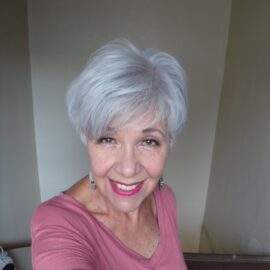How my story begins: When I turned 40 I started to experience a bit of tiredness and attributed it to "middle age". All of my pap tests were fine but at age 43 I developed a clear, watery discharge. I attempted to treat what I thought was a vaginal yeast infection with over the counter drugs. Again, all of my pap tests were fine, my periods were regular and I was pain-free. After six months with no results the discharge became heavy and I decided to see a new gynecologist as we had recently moved closer to my then husband's workplace.
The nurse prepared me for the exam and then stood straight up, looked me in the eyes and said "I better have the doctor look at you". At this point I was only mildly alarmed. My gyn examined me, told me that I had a "polyp" and ordered a uterine biospy, still not mentioning the word "cancer". After a painful procedure and lab test, my doctor called and told me that I had endocervical adenocarcinoma and that this was "serious".
I asked if I should make a will and was told that it would be a good idea. She wanted to schedule me for a radical hysterectomy but after my refusal to accept a blood transfusion, we elected for radiation treatment. HPV was being researched back in 1997 so I have no idea if this was the cause of my cancer. Chemotherapy was not an approved treatment in 1997 and was still in clinical trials for use with radiation therapy.
Life before my diagnosis: I enjoyed an active career as a hotel executive opening properties on a task force for the Hyatt and Marriott hotel chains. I married later in life at age 35 and enjoyed traveling, working part-time and loving my newborn son after giving birth at the age 40.
How I felt after diagnosis: My gynecologist, who was also a cancer survivor, suggest that I "get mad, scream, cry, get the anger out... and then get ready to FIGHT". I went home and did just that by running around my herb garden crying, yelling quite angrily and then laughing as I realized what I must look like.
I never felt "why me" but instead felt "why NOT me"; we are all human and circumstances befall each and every one of us without selection. I was in the process of getting a divorce (my husband had left us), I was laid off from my job and the house we were renting went up for sale. BUT I was at peace; putting everything on hold but my health and I was determined to FIGHT.
Telling my family and friends: This was the hardest part. My mother cried that "they are burning my baby!" and I was not allowed to see my four year old son for quite a few times during radiation treatment. My soon to be former husband was very uncomfortable about talking with me but very supportive of our son. Some friends could not even talk about it, I understood and forgave them for that, others rallied around me as I had absolutely NO family nearby.
My treatment: I spent most of the last half of 1997 in and out of the hospital. Treatment at that time for stage 2B was six weeks of external radiation followed by two four day stays in the hospital for brachytherapy (internal cesium radiation implants). I drove 60 miles round-trip daily for the external radiation and drove myself to the hospital for the internal treatments.
How I felt after treatment: Exhausted be elated that it was over and amazed at myself that I found the inner strength to accomplish it alone. Prayer and meditation... and the love for my young son is what got me through it.
What was most difficult for me: Not being able to see my son for almost half a year was terribly difficult and not having the support of family close by. When one has cancer, the fight is yours alone.
What I did to help myself: Prayer. Meditation. I researched my type of cancer and treatment and joined an AOL cervical cancer chat room (remember those???) for comfort, support, advice and love.
My life after cancer: I made a "bucket list" and have accomplished a lot from returning to motorcycling to joining and touring with Cirque du Soleil. I also volunteered to work for a well known cancer organization fundraiser, chaired an event and am proud to say that over the course of five years helped to raise over a quarter of a million dollars for cancer research, education, advocacy and service.
Where I am today: Happily retired, constantly updating my "bucket list" and so very grateful to see the sun rise each and every day.
What I want other women to know: You have absolutely NOTHING to be ashamed of when diagnosed. Pass along your knowledge and support in honor of those that gave you the courage and support that you so dearly needed when you were on your own personal journey. Never give up.
How I will try to help others: I encourage others to know that they are not alone, that the longer you stay alive the longer you will benefit from new treatments, and I will pass along the love and support that I received as long as I am on the planet. Advocacy and giving a voice to survivors is critical.
